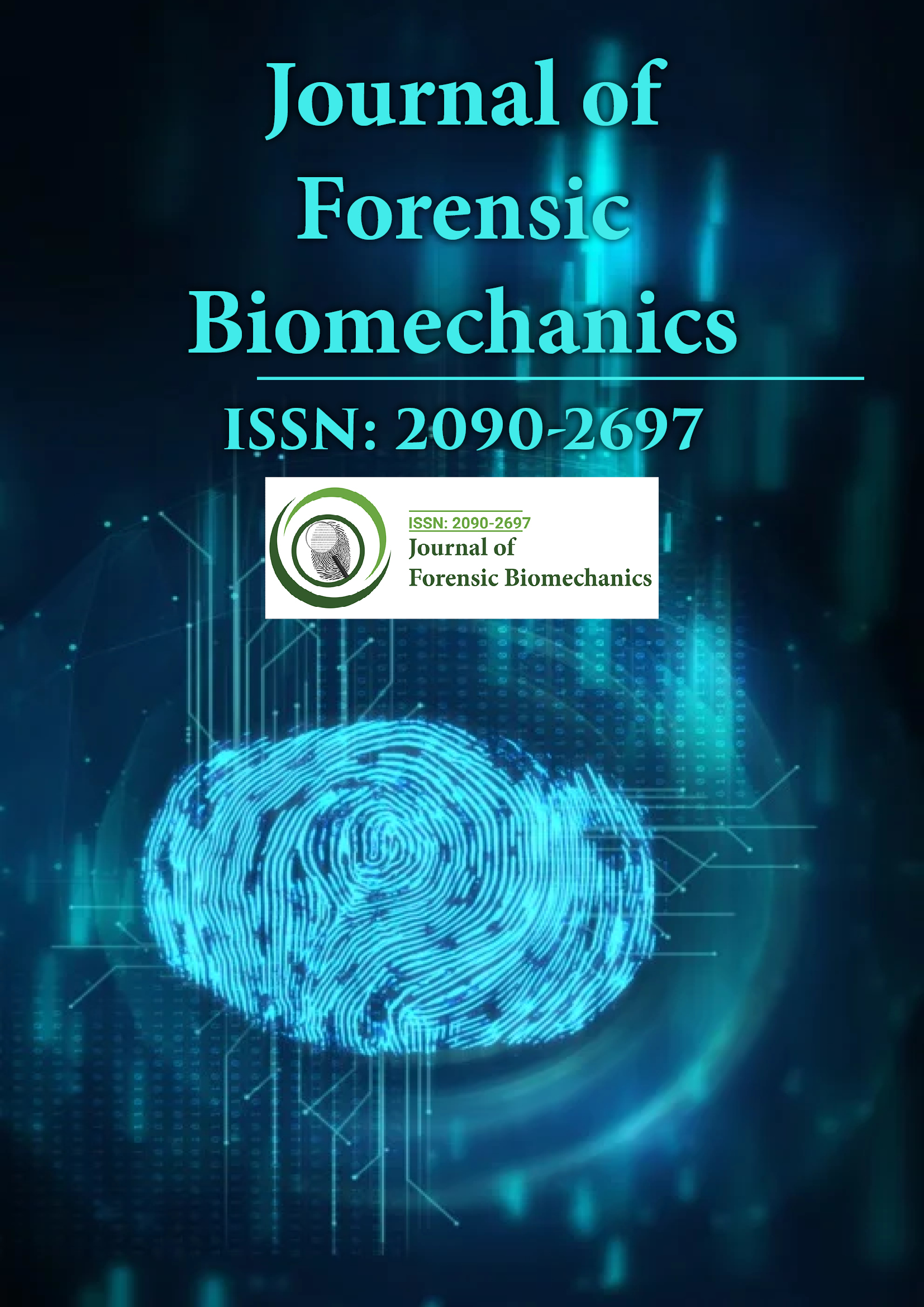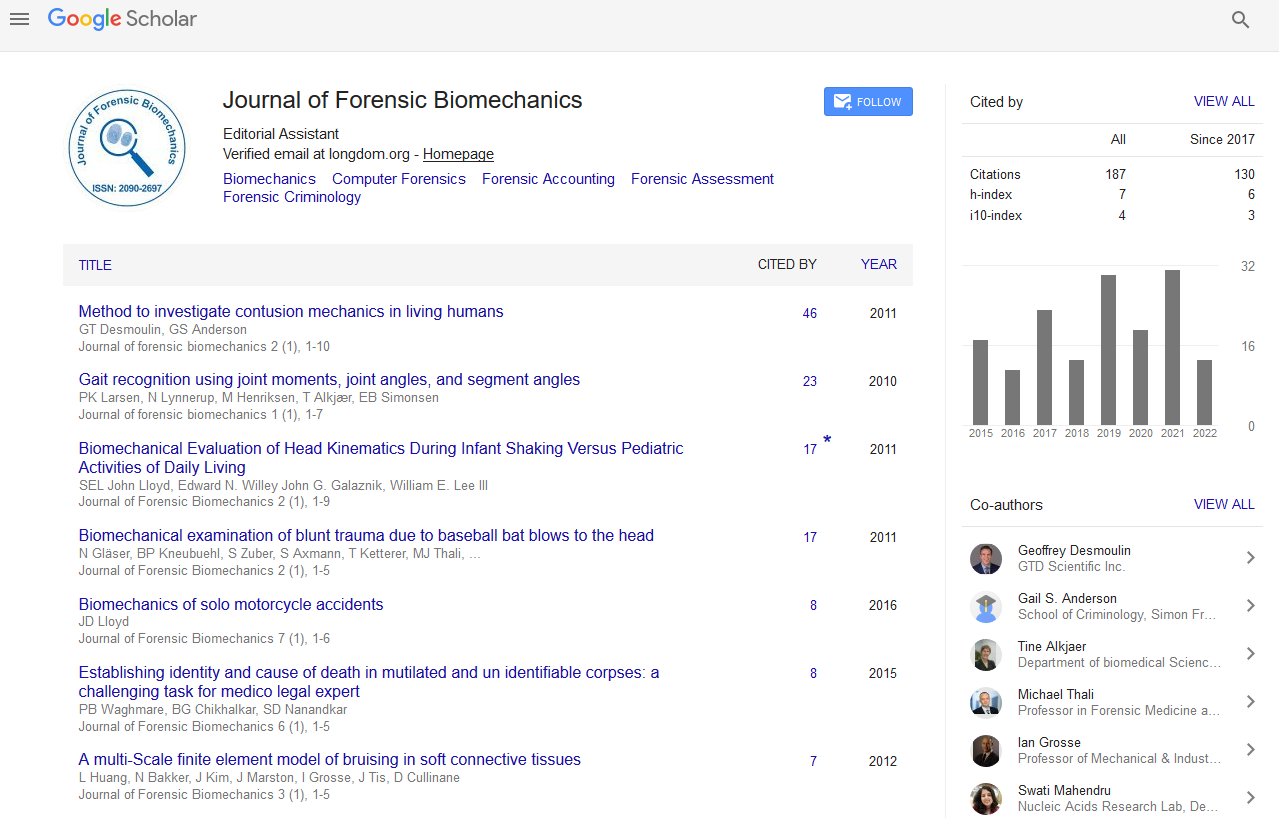Indexed In
- Genamics JournalSeek
- SafetyLit
- Ulrich's Periodicals Directory
- RefSeek
- Hamdard University
- EBSCO A-Z
- Geneva Foundation for Medical Education and Research
- Euro Pub
- Google Scholar
Useful Links
Share This Page
Journal Flyer

Open Access Journals
- Agri and Aquaculture
- Biochemistry
- Bioinformatics & Systems Biology
- Business & Management
- Chemistry
- Clinical Sciences
- Engineering
- Food & Nutrition
- General Science
- Genetics & Molecular Biology
- Immunology & Microbiology
- Medical Sciences
- Neuroscience & Psychology
- Nursing & Health Care
- Pharmaceutical Sciences
Commentary - (2021) Volume 12, Issue 5
Commentary on Process of Evaluation and Assessing Criminal Behavior from a Psychological View
Charles Potts*Received: 11-Nov-2021 Published: 02-Dec-2021, DOI: 10.35248/2090-2697.21.12.384
Description
Criminal behavior depends on biological, psychological, and societal elements in the individual's personality. The psychological examination and assessment of other humans are similar to criminal behavior.
As a result, many psychological evaluation procedures, exams and measurements employed in the forensic evaluation of criminals come from outside the discipline. The availability of these resources to forensic psychologists is dependent on advancements in academic, educational, and clinical psychology.
In 2007, the dictionary of psychology explained that, psychological assessment is collecting and processing data to create a psychological evaluation, judgment, or suggestion. A psychological test is a standardized tool used to assess a wide range of skills, aptitudes, and characteristics.
Sometimes forensic testing differs from conventional testing in its purpose and understanding of who is being tested. The main dissimilarity is that, in a mental health examination, the customer is the examinee in a forensic evaluation. To assist in decision making, the customer has to answer some legal questions.
Tests Useful In Forensic Assessment and Evaluation
Forensic psychology makes extensive use of psychological research and evaluation methods. According to a survey, forensic psychologists employed the MMPI-2, one of the Wechsler IQ or memory tests, one of the Hare Psychopathic Checklist versions, the Structured Interview of Reported Symptom, and the Personality Assessment Inventory often.
Basic assessment tools are:
• Interview,
• Behavioral observations,
• Tests, and
• Other specialized instruments.
The following considerations must be considered into account while executing any test for forensic investigation:
• Suitable research and standards with a population similar to that of the examinee,
• Sufficient test development and psychometric qualities, and
• Capacity to connect test results to referral question findings.
Mental status examination
The main aim of the mental status assessment is to determine the presence and extent of a person's mental disability. The MSE assesses a person's sense of time, location, and personal identification, as well as their memory, speaking, general intellectual level, arithmetic ability, insight or judgment, and problem-solving ability.
The MSE findings may point to specific areas for more testing or certain sorts of mandatory testing. It will help us regularly to ensure or record changes in a patient's health. The main components are:
• Appearance, attitude, and behavior.
• Mood and affect.
• Speech and language.
• Thought process and content.
• Perception
• Cognition.
• Insight and judgment.
Cognitive interview
The Cognitive interview helps to improve the people who are cooperative but unable to recall the event. An interview is a oneon- one conversation between the interviewee and the interviewer. The main points of an interview:
• Proper phrasing of interview questions.
• Interview schedules.
• Set of rules or procedures for using the schedules.
• Conducting the interview.
• Recording the responses.
Cognitive testing
The concept "cognition" refers to mental processes that enable us to do daily tasks. This technique was developed in the field of Neuropsychology, which includes a variety of tests that measure basic intelligence, learning and memory, sensory perception and sensory-muscle integration, reasoning and problem-solving abilities, language and communication abilities, and basic academic skills. This approach is useful in forensic instances involving brain injuries, chemical exposure, or concerns of competency or ability.
Conclusion
In this paper, we concluded that how forensic psychology is used in criminal behavior. The psychological inspection and evaluation of other individuals are analogous to criminal behavior. Psychological research and evaluation methodologies are extensively used in forensic psychology. We discussed the tests used in evaluating and assessing criminal behavior.
Citation: Potts C (2021) Commentary on Process of Evaluation and Assessing Criminal Behaviour from a Psychological View. J Forensic Biomech. 12: 384.
Copyright: © 2021 Potts C. This is an open-access article distributed under the terms of the Creative Commons Attribution License, which permits unrestricted use, distribution, and reproduction in any medium, provided the original author and source are credited.

